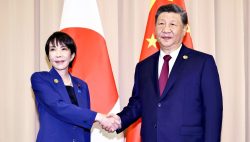Agreement among LDP, Komeito, DPFP: Is it Responsible of Ruling Parties to Just Make Concessions to Opposition?
16:12 JST, November 22, 2024
While it is necessary for the ruling and opposition parties to discuss policies, it is not acceptable for the ruling coalition to simply accept demands from the opposition side. The ruling and opposition parties should create a cooperative framework in which they take responsibility for shared policies, including measures to secure financial resources to implement them.
The ruling Liberal Democratic Party, its coalition partner Komeito and the opposition Democratic Party for the People have agreed on the contents of comprehensive economic measures. Reflecting a DPFP demand, the measures include an increase in the ¥1.03 million annual income threshold for the imposition of income tax — the so-called ¥1.03 million barrier. A policy to consider reducing the gasoline tax was also included.
The government plans to submit a supplementary budget proposal focusing on the economic measures to the extraordinary Diet session to be convened on Nov. 28. The DPFP intends to agree to the proposal.
The minority government of Prime Minister Shigeru Ishiba cannot pass budget proposals or legislative bills without the cooperation of opposition parties. The fate of the administration can be said to be in the hands of the opposition parties, including the DPFP.
For this reason, it has become necessary for the ruling parties to consult with opposition parties to reach policy agreements. In that case, it is natural that they share responsibility not only for the benefits but also the burdens that their policies bring about.
Regarding the ¥1.03 million barrier, if the threshold is raised to ¥1.78 million, as the DPFP advocates, tax revenues for the central and local governments are expected to decrease by ¥7 trillion to ¥8 trillion. The problem is how to secure financial resources to compensate for the decrease.
The LDP and Komeito attempted to include in the economic measures the phrase “paying attention to the impact on fiscal conditions for the central and local governments.” However, the phrase was not included because the DPFP objected to it.
The DPFP claims that “the central government should think” about the financial resources.
Ishiba is trying to keep his Cabinet alive without taking responsibility for the defeat in the recent House of Representatives election. If the DPFP intends to score points by taking advantage of the administration’s weakness, it is no different from a pressure group. The DPFP is not even a worthy member of a “partial coalition” in which the ruling parties cooperate with it on a policy-by-policy basis.
The attitude of trying to evade responsibility for the implementation of policies is not limited to the DPFP but can be seen in other opposition parties as well.
The main opposition Constitutional Democratic Party of Japan has submitted to the lower house a bill to address another annual income barrier — the threshold of ¥1.3 million above which earners are subject to the burden of paying social insurance premiums.
The bill says that when annual income reaches ¥1.3 million and the worker is required to pay social insurance premiums, the decrease in their take-home pay will be covered by benefits to be provided to them. The CDPJ has estimated the necessary financial resources at ¥780 billion, but the bill lacks specifics on measures to secure the financial resources.
The CDPJ, the Japan Innovation Party and other opposition parties are trying to make the issue of politics and money involving the LDP the biggest topic in the extraordinary Diet session.
While reforms to make the handling of political funds more transparent are important, there is an urgent need to deal with difficult issues, such as the declining population and the worsening security environment. The ruling and opposition parties must honor the public’s trust through constructive policy debates.
(From The Yomiuri Shimbun, Nov. 22, 2024)
Top Articles in Editorial & Columns
-

Myanmar Will Continue Under Military Rule Even After Election, Ex-Ambassador Maruyama Says in Exclusive Interview
-

40 Million Foreign Visitors to Japan: Urgent Measures Should Be Implemented to Tackle Overtourism
-

Expansion of New NISA: Devise Ways to Build up Household Assets
-

China Criticizes Sanae Takaichi, but China Itself Is to Blame for Worsening Relations with Japan
-

Withdrawal from International Organizations: U.S. Makes High-handed Move that Undermines Multilateral Cooperation
JN ACCESS RANKING
-

Univ. in Japan, Tokyo-Based Startup to Develop Satellite for Disaster Prevention Measures, Bears
-

JAL, ANA Cancel Flights During 3-day Holiday Weekend due to Blizzard
-

China Confirmed to Be Operating Drilling Vessel Near Japan-China Median Line
-

China Eyes Rare Earth Foothold in Malaysia to Maintain Dominance, Counter Japan, U.S.
-

Japan Institute to Use Domestic Commercial Optical Lattice Clock to Set Japan Standard Time




















